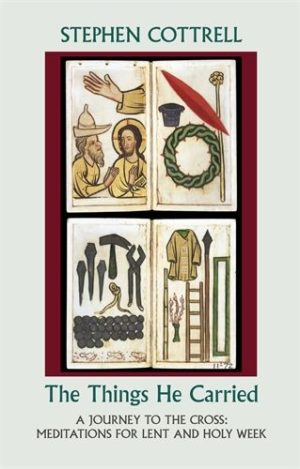



He carried our sorrows.
Nothing was too small for him. All the fragments were gathered up.
And nothing was too large or too heavy. He carried the tiny, casual disappointments, the lost hopes and shattered dreams that reverberate through a lifetime. And he carried the huge, ravaging hurts, where tragedy bites and the tectonic plates of a lifetime shift.
He carried the lives that are lost before they have hardly begun, the lives cut short, and the lives that are savagely realigned by grief or injury or abuse.
How can we list all this pain? How can we account for it? Only that we see it in his arms gathered together, carried: the pain of miscarriage, the lost potential of abortion; the confusion and indifference that cohere; the sudden inexplicable tragedies of so-called accidents; the friendly fire, the severed limbs, the collateral damage and all the unspectacular horrors of war; the steady deterioration of the body; the unhurried affliction of dementia; the howls of grief cried out at the never-ending hours of death; the emptiness of the days that follow; the creak of the gate; the footsteps on the path; the heartbeat knocking on the door; the unopened telegram; the phone unanswered in the hall; the torn fragments scattered in the fire; the dying embers offering up their heat, separating and departing; the crumbled earth dropping from our fingers as we step back from the graveside; the backward gaze that overshadows the evening of every life; and the stabbing intrusion of regret. He cradled them. Each was handled with a patient gentleness and an understanding that only comes from one who has known sorrow himself.
And gazing from the cross itself he saw it. All the failure and all the pain bound up together, and how one often feeds upon the other, so that the abuse of one life begets the abuse of another, victim and abuser bound together in a terrible cycle of horror and pain. And he did not make excuses, nor pretend that all the knotted skeins of our lives could be unravelled, smoothed out, understood. He saw us for what we are. And he loved us. And his words – and now unreservedly in his eyes – offered compassion, forgiveness. Not that you need to be forgiven for pain. But for all of us it is muddled together. He had the keys of the kingdom in one pierced hand and the balm of healing in the other. And he brought us both of them. He carried them.
He was a man of sorrows and acquainted with grief…
He was oppressed and he was afflicted…
He carried our fears; and he knew about fear. The sweat had poured from his body, and with it great drops of blood. He had been without food and drink. He had faced it down.
He carried our sorrow, and he knew about sorrow. He wept at the grave of his dear friend Lazarus. When he beheld the city, Jerusalem, that had killed so many prophets and turned its back on God, he wept. He embraced the lost and lonely. He held the frightened in his arms. He slipped his hand into the hands of tiny children and he comforted them. He broke his bread with those who are excluded and rejected by the world. He crossed boundaries. He sat down in exclusion zones. He sought out the very ones the rest of us had hidden away. He felt the pain of difference and indifference, of nepotism and of prohibition. He overturned tables and he broke down barriers. He upended expectations. He was never what anyone wanted him to be. And so he carried his own sorrow, knowing that to please God meant the displeasure of everyone else, and then their contempt heaped upon him. For that was what they did now – all their rile, their rancour, their ridicule and their rage they poured upon him; they sought to devour him, to bury him, to destroy him. But even this – this naked perversity– he carried it. He saw the uncovered countenance of evil and he wept with sorrow, cried out in forgiveness, embraced it, carried it, drew its sting into himself, and defeated it.
He carried our doubts and he knew about doubt. Knew it was a part of faith: the necessary reverse of the coin. He had wrestled in the garden. He had faced the seductions of evil – the beguiling comforts of an easier road. And hardly able to believe that he is carrying us, and torn apart by our limitations, he carries doubt, his and mine and yours, carries the very doubt that looks at him, wonders whether he has anything save a certain charismatic madness, and turns away.
Hold an empty basket. Imagine it being filled with the fears, sorrows, doubts and anxieties of your life and of every life. Imagine all this being held, carried and understood. Imagine the love that would do such a thing.
If you are in a group, you may either do this by passing the basket around, or by placing the basket in the middle and inviting people to write down what they would like held, which they then place in the basket.
If you are on your own, either just hold the basket and think about it, or write things down which you can place in it.
Then try to remember back to being held yourself. Recall a childhood memory of being lifted up, or twirled around, or being carried to bed.
If you are in a group, share these memories.
If you are on your own, just think about them.